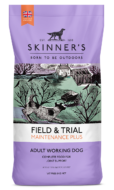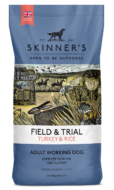Arthritis – Is your dog suffering in silence? How you and your dog’s diet might be able to help
Blog , +2
September 25, 2019

Written by: Dr Jacqueline Boyd, BSc (Hons), MSc, PhD, PGCHE, CHES, FHEA, MRSB
Nutritional Consultant, Skinner’s Pet Foods
Have you recently noticed your dog’s behaviour has subtly changed? Are they less keen to run and play? Do they seem reluctant to get up out of bed or jump on and off items that they once found easy? If so, your dog might be showing the early signs of arthritis (also called osteoarthritis) and they are not alone.
Estimates suggest that about 80% of older dogs suffer from arthritis, although it can also affect very young dogs as well, sometimes because of traumatic injury or conditions such as hip dysplasia. Arthritis is a condition where the joints become inflamed as a result of wear and tear, age and sometimes injury and other conditions. This leads to decreased mobility of the joint and pain, which can then affect the whole body. Arthritis is a painful and progressive condition and one that can impact significantly on your dog’s quality of life. For many active dogs, arthritis can be a distressing change for both dog and owner, where activities that were once undertaken with relish become painful and less fun. However, there are things that you can do to help and if you have noticed that your dog is maybe not quite as bouncy as they once were, here are some of our top tips to help manage arthritis and support your dog;
1. Visit your vet – this is important to ensure a correct diagnosis and to identify the extent of the condition. Your vet might also discuss pain management and supportive therapies that will best suit you and your dog’s situation. Pain management is crucial as dogs are very good at hiding pain initially, and by the time your dog is really showing symptoms of pain, they are likely to be suffering significantly.
2. Watch their weight! – keeping your dog in a fit, lean condition is one of the easiest things you can do to limit and manage the symptoms and progression of arthritis. Weigh your dog regularly and monitor their body condition to keep them in great shape.
3. Embrace exercise – regular, gentle exercise is important, even for dogs with diagnosed arthritis, as it can help maintain a fit, lean body condition and help overall mobility. Exercise is also good for mental and physical stimulation for your dog and look at alternative forms of exercise – non-weight bearing exercise such as hydrotherapy with a qualified hydrotherapist can be hugely beneficial to arthritic dogs, so chat to your vet about a referral to a suitable centre.
4. Limit landings! – try to reduce the amount of jumping on/off or in/out that your dog does as this can, over a long period of time, impact on joint health. Consider using ramps or steps whenever possible and think about the landing surface, with hard, slippy surfaces being especially bad news for joints.
5. Big-up bedding – your dog’s sleeping area can help, especially if it is dry, warm and provides support and comfort around what might be painful joints. Keeping your dog warm can also help manage arthritic discomfort and if they get wet, dry them off well.
6. Factor in food – the amount you feed is important to help manage a lean body condition, but also consider the use of diets formulated to include ingredients that may support joint health such as omega -3 fatty acids (such as Field & Trial Salmon & Rice) or ingredients such as glucosamine and chondroitin (included in all the Field & Trial sensitive range, including Grain Free, and Light & Senior). You could even explore the use of specific supplements such as Joint Aid for joint support which is included in Field & Trial Maintenance Plus and Turkey & Rice.
7. Seek support – there is a huge amount of useful and supportive advice available for owners of arthritic dogs. One fabulous and evidence-based resource is “Canine Arthritis Management” and can be found here https://caninearthritis.co.uk/. It is well worth a look to help you, help your dog!
Our foods that contain Joint Aid for Dogs:

Maintenance Plus
Formulated to support healthy joints.
£10.39 – £40.59

Turkey & Rice
Specially formulated for joint support.
£12.75 – £53.89



